Follow Tacoma-area volunteers on their year-long journey with a refugee family
About the program
LCS Northwest’s Circle of Welcome program allows faith and community groups to walk alongside a refugee or refugee family for one year. There are three models: Newly-Arrived, Post-Arrival, and Distant Partner. Each includes a minimum financial commitment, and a variety of support activities for groups to pick from. For more information about starting a Circle of Welcome group, contact Sheridan Moore at [email protected] or (503) 893-8853.
CHAPTER 4
‘THEY ARE LIKE MY UNCLES’
A celebratory meal prepared by an Afghan family is a feast like no other. Hospitality ranks high among the virtues of Islam, and it was on full display on a recent Saturday afternoon.
Our Afghan friends spared no expense — or herb or spice, or roasted clove of garlic, or square inch of their dining room table — in the delicious lunch they served us at their Tacoma rental home.
Presiding over the bountiful celebration was Falak Sher, father of the family of nine that our LCSNW Circle of Welcome group started assisting in October. He was clearly proud today — proud to play host, to reach a major milestone of independence, and to have a group of trusted American companions by his side.
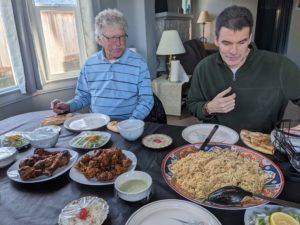
The men in our group ate before the women and our Afghan hosts. Don’t worry – there was plenty of food left for them.
Also visiting today were Falak Sher’s Afghan friend, Mohammed, and his family from Federal Way. Both men are married fathers of seven children; they met last year at a refugee camp in Qatar, before their resettlement journeys brought them to the Puget Sound region.
The words that Falak Sher used to introduce us to his friend were unexpected, intimate, and touching.
“They are like my uncles,” he said, warmly gesturing toward his five American male guests.
A total of 30 family and friends would be eating at his home today, spread around the house at a large table (American style) and on rugs (Afghan style). We sat down in staggered shifts to enjoy platters of rice, chicken and other meat, falafel, flatbread, fruit, green salad and custard. Oh, and it wouldn’t be an Afghan party without cans of Mountain Dew.
The men in our group ate separate from, and an hour ahead of, the women, in accordance with Pashtun custom.
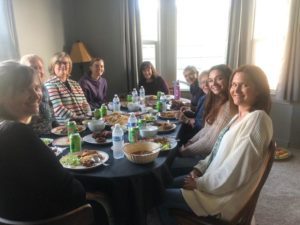
Serving us at a table was an accommodation to our American customs. When it’s their turn to eat, the Afghans sit on rugs on the floor.
Afghan heads of household don’t need a special reason to show hospitality. Falak Sher often invites us in for tea when we drop him off after his workday at the lumber yard or after we take his children to a medical appointment. Because we are Americans always in a hurry, we decline more than we accept.
But today’s invitation was an extra big deal. The dinner was held to celebrate his obtaining a driver’s license. Together with the gift of a used minivan from one of our group members, it signified a major step of self-reliance.
For our Circle of Welcome group, it was also an occasion to take stock of all that we have helped the family accomplish.
All nine of them now have Social Security Numbers, Washington state ID cards and up-to-date vaccination records. Four children attend public high school; an older son is planning to start a basic ed course at Tacoma Community College this spring. Falak Sher and his oldest son have good-wage, full-time temporary jobs at the Port of Tacoma, with a path to permanent employment. They have a checking account, vehicle title, and car insurance.
All this, plus another badge of modern American life: a Costco membership card.
Not everything is sunshine and roses. Falak Sher has had sticker shock from his utility bill and the deductions from his paycheck. Our group struggles to communicate with family members other than him, due to language barriers and shyness. Traditional gender norms have prevented us from all gathering together — men, women and children. We are hopeful that one day we may be able to do that, if and when they are comfortable.
But all things considered, our one-year Circle of Welcome journey is off to a very encouraging start.
I believe all of Falak Sher’s adopted uncles and aunts would agree.
CHAPTER 3
COULD YOU START OVER LIKE THIS?
If you’ve ever moved to a new community, you’re familiar with the heavy lifting, tedious details and second thoughts that go with it. Imagine you’re a parent in a family of nine, including seven children ages 11 to 22. You are the only English speaker, none of you know the culture, you don’t have relatives nearby, you don’t have a driver’s license or any real job prospects.
What you do have is three months rent from Lutheran Community Services Northwest, and help from a loosely organized group of eager strangers who call themselves a Circle of Welcome.
So it is with the father of the Afghan refugee family around whom our Circle has formed. Over the past few weeks, we have helped them slowly transform their Tacoma rental house into a home.
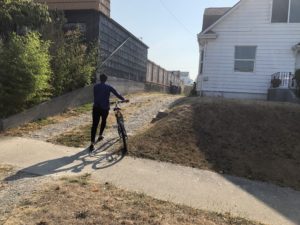
One of the family’s five sons wheels a newly delivered bike to the back of the house.
With friendly exchanges of “hello” and our occasional halting attempts at greetings such as “Salaam alaikum,” we’ve delivered furnishings, food and sewing supplies. We’ve connected them with an affordable internet plan, plus other utilities. Last weekend I delivered three bikes, locks and helmets, courtesy of the Bikes for Kids program at Marine View Presbyterian Church. And we eventually managed to hook up a television, allowing the boys to watch reruns of their favorite cricket matches – a simple pleasure that reminds them of what they left behind.
After fleeing Taliban-ruled Afghanistan, they traded one kind of uncertainty for another. The family was housed at a U.S. refugee camp in Qatar from June 29 to Sept. 13, when they landed at Sea-Tac Airport. They stayed with friends in Kent until moving to Tacoma in early October.
Enrolling at least four Afghan children in public schools is no simple process. Neither is lining up school vaccinations and arranging medical screenings for the whole family. But the father is motivated to complete all these tasks, and find work for himself and his oldest son.
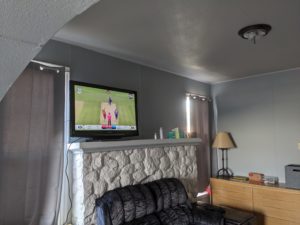
The simple pleasures of a recorded cricket match.
He speaks English well, even taught it to middle school children back home, so he believes he can make a successful transition within a few months. He worries that he’s troubling us, despite our assurances to the contrary. He says his family won’t need the Circle for the full year we’ve signed up for.
I hope he is right, since self-reliance is the goal of refugee resettlement. But there’s another part of me that hopes he is wrong, and that the Circle goes unbroken. Given enough time, I suspect we may learn as much from them as they do from us.
CHAPTER 2
PEOPLE, NOT DOLLS
Refugee resettlement is a messy business. Rewarding, but messy.
We were warned to manage our expectations as a Circle of Welcome. We were advised to be flexible, just as LCSNW’s experienced case managers have learned to do. Even so, we weren’t prepared for the roller coaster ride that started within days of welcoming an Afghan family of 11 to Tacoma. Especially considering how smoothly the pieces fell into place before they arrived.
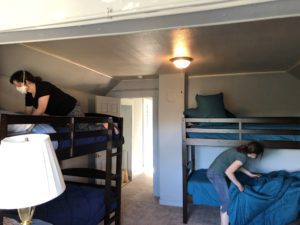
Assembling four sets of bunkbeds was the hard part. Adding clean bedding was easy by comparison.
As soon as we were notified that an extra-large family had accepted the home and would arrive in less than two weeks, our circle sprang into action. Lauren and Margaret, our co-leaders, produced inventory spreadsheets with military precision. Donations from our two participating Gig Harbor churches quickly poured in.
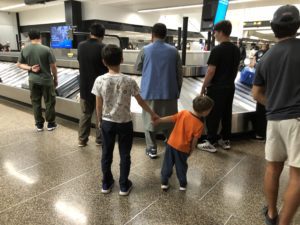
The airport arrival.
Our first meeting with the family went fine. On Aug. 23, four of us met them at Sea-Tac Airport, gave them oranges, water bottles and words of greeting in fractured Pashto. We delivered to the Tacoma home all the possessions they have left in the world, contained in 13 pieces of luggage. The exhausted family wanted to spend the first night with relatives in Kent who arrived six months ago.
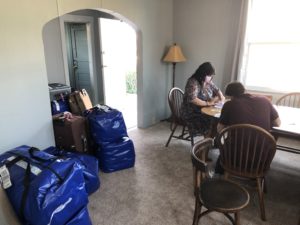
The signing of the lease agreement.
One month later the dark mood is starting to lift. An Afghan family of nine moved into the Tacoma home this week. The head of household signed the lease. He said the family wants to live there, is eager for our group’s support.
At a time when LCSNW is absorbing another large wave of Afghan refugees and assisting many Ukrainians, Circles of Welcome can make a real difference. We will do what we can to help put one family on a path to stability.
But this time we know to temper our expectations. And as we get acquainted with our new friends, we will have a deeper appreciation for their autonomy and complexity. They are not dolls in a dollhouse.
CHAPTER 1
A CIRCLE IS FORMED
Look at us on paper, and you won’t see much at first glance that binds this team together. Some folks met each other for the first time at a summer barbecue. Others haven’t seen each other in years.
You have to look deeper to find the common purpose that drew us into a tight circle.
It’s not just any circle; it’s a Circle of Welcome. And soon it will center on a family of 11 refugees.
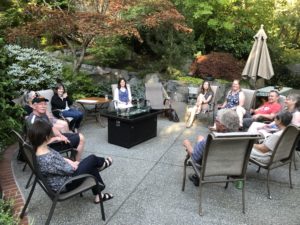 Age wise, our group ranges from Baby Boom to Gen Z — from 70-somethings to early 20s.
Age wise, our group ranges from Baby Boom to Gen Z — from 70-somethings to early 20s.
Professionally, we cover the spectrum. There’s a retired oncologist, PE teacher and career Defense Department employee, plus a couple of former nurses. There’s a chemical engineer, physical therapist spouses, a human resources manager, a pastor and his wife, and myself, the communications director at Lutheran Community Services Northwest. Other members are equally diverse.
We also have different stories when it comes to our faith backgrounds. While many feel called by the Christian gospel, not all are regular churchgoers.
What unites this team is a shared determination to help one refugee family make a fresh start, oceans apart from the repression and fear they faced back home.
The welcome model is used by refugee resettlement agencies around the United States, including LCS Northwest.
This summer, two churches in Gig Harbor — Peninsula Lutheran and One Hope — decided to circle up. It took several weeks to enlist a core group of roughly a dozen people, get trained and organized, appoint leaders and sign up for tasks. COVID outbreaks slowed us down further.
Then in a moment came the exciting news: An Afghan family of 11 would arrive in two weeks. A home would have to be prepared, pantry shelves stocked.
The circle has been formed. Now the long welcome begins.
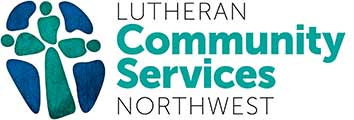
0 Comments